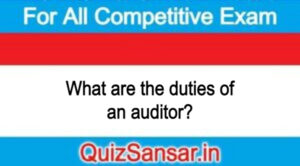
What are the duties of an auditor?
What are the duties of an auditor?
Ans.
DUTIES OF AN AUDITOR
(1) Duty to make report: An auditor is appointed to keep a check on the directors and therefore he has to send his report to the member even though he might have been appointed by the directors as we have already seen in the beginning of this chapter. He is the agent of the shareholders to examine the accounts maintained and supervised by the directors and to report to them whether the directors have properly maintained the accounts (Spaceman vs. Eans): (1868). Lindley J. said….” the auditors are to be appointed by the shareholders, and are to report to them directly and not to or through the directors. The object of this enactment is obvious. It evidently is to secure to the shareholders independent and reliable. information respecting the true financial position of the company at the time of the audit.” (Ref. London and Central Bank, 1895). It is not the duty of an auditor to see that his report has been sent or placed in the hands of the shareholders. After having signed his report and the balance sheet and having sent it to the secretary of the company, his duty is over, as was held in Re Allen, Craig & Co. (London) Ltd. in 1934.
(2) Maiters to be stated in the report- Auditor will report to the shareholders about the accounts which have been audited by him. The report shall contain the following:
(a) whether or not he has obtained all the information and explanation which to the best of his knowledge and belief were necessary for the purposes of his audit;
(b) whether, in his opinion, the Profit and Loss account referred to in his report exhibits a true and fair view of the Profit and Loss; and
(c) whether, in his opinion, the balance sheet referred to in his report is properly drawn up so as to exhibit a true and fair view of the state of affairs of the company according to the best of the information and explanation given to him as shown by the books of accounts;
(d) whether in his opinion, proper books of account as required by law have been kept by the company so far as appears from his examination of those books, and proper returns adequate for the purposes of his audit, have been received from branches not visited by him;
(e) whether the report on the accounts of any branch office audited under section 228 by a person other than the company’s auditor has been forwarded to him as required by clause (c) of sub-section (3) of that section and how he has dealt with the same in preparing the auditor’s report;
(f) whether or not the balance sheet and profit and loss account have been drawn up according to the requirement of the Companies Act. (form and contents of the balance sheet and profit and loss account as required by section 211 are given at the end of this chapter).
The auditor shall also inquire, according to S.227(IA)-
(a) whether the loans and advances by the company against security are properly secured and that the terms of the loan and advances are not against the interests of the company or its members;
(b) whether the transactions of the company, which are represented merely by book entries are not prejudicial to the interest of the company;
(c) in the case of a non-banking company, whether the company has sold its investment, such as debentures, shares, etc., during the year at a price less than the purchase price;
(d) whether loans and advances made by the company have been shown as deposits:
(e) whether personal expenses. have been charged to revenue account; and
(f) where the company has allotted shares against cash, whether the cash has actually been received and whether the position as stated in the account books and the balance sheet is correct, regular and not misleading.
If the answer to the above matters is in negative or with qualifications he shall report the reason for the answer.
How is an auditor to ascertain the true position of the company’s affairs. The answer is, by examining the books of the company. But he does not discharge his duty by doing this without enquiry, and without taking any trouble to see that the books themselves show the company’s true position. But his first duty is to examine the books, not merely for the purpose of ascertaining what they do show, but also for the purpose of satisfying himself that they show the true financial position of the company. (Ref London and General Bank). Again, it was pointed out by Madras High Court in Registrar of Companies, Bombay vs. Hedge (1954) that the duty of the auditor is not merely to satisfy himself with the arithmetical accuracy of the balance sheet, as compared with the books of the company, but to enquire into and satisfy himself with the substantial accuracy of the balance sheet and to see that it contains a true and correct picture of the company’s affairs. Similar view was expressed by the learned judge in the cases of Deputy Secretary to the Government of India, Ministry of finance vs. S.N. Dasgupta in 1956 and Controller of Insurance vs. H. C. Das in 1957. The auditor has got the duty to mention in his report if he is not satisfied with regard to any point or if he could not get any information or explanation that in his opinion should be placed before the members.
If the system of book-keeping is bad, the auditor should make a suggestion regarding the alteration and if the directors do not follow his suggestion, he should mention the fact in his report. Of course he cannot force the directors to change the book-keeping.
(3) Duty to assist Investigators- It is the duty of an auditor to assist the Inspectors in every possible way when the affairs of the company are being investigated. He can be asked to produce the working papers for the purpose. [section 240(v)(b).]
(4) Duty to call- It is the duty of the auditor to call for information on various points, such as (a) whether loans have been properly secured. (b) whether the shares, debentures securities, etc., have been sold at less than the purchase value, and (c) whether the personal expenses have been charged to revenue account, etc. It may be stated here in this connection that before the Companies Act was amended in 1965, the auditor was entitled to make such an inquiry but after the amendment, a duty has been cast upon the auditor to state in his report whether he has taken such steps or not. He has also to express his opinion as whether the loans advanced are secured or not. He should also state money deposited by the public with the company has been shown in the balance sheet as deposits.
- What is meant by Database Management System?
- Discuss the advantages and drawbacks of database.
- What do you mean by database ? Discuss its Characteristics.
- What is Data Mining?
- What are the conditions of communication?
- What do you mean by business communication ?
- organization / Differentiate between classical and modern theory of organization
- What is forecasting






